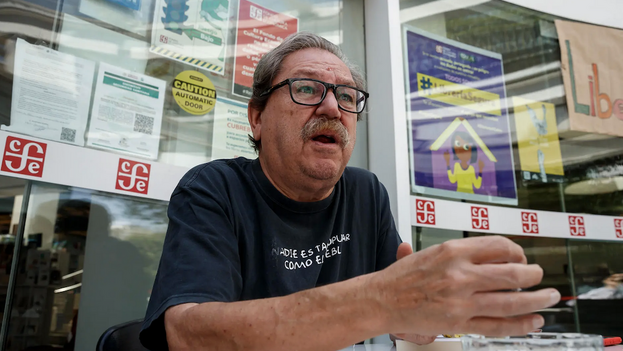
![]() EFE/14ymedio, Havana, February 15, 2023 — The director of the emblematic Mexican state publisher Fondo de Cultura Económica (FCE), Paco Ignacio Taibo II, gave an interview to EFE in which he asked the official journalism of the Island to “increase the critical level that expresses what people say on the street.”
EFE/14ymedio, Havana, February 15, 2023 — The director of the emblematic Mexican state publisher Fondo de Cultura Económica (FCE), Paco Ignacio Taibo II, gave an interview to EFE in which he asked the official journalism of the Island to “increase the critical level that expresses what people say on the street.”
The writer, a militant of the Mexican left, who is in the Cuban capital within the framework of the Havana International Book Fair, considered that there is a “disconnection” between the discourse related to the Government and the vision of the common Cuban.
“We have to lose fear of critical capacity,” continued the journalist, who gave value to “the criticism to the left from the left.”
For Taibo II, author of titles such as Ernesto Guevara, también conocido como el Che [Ernesto Guevara, also known as Che], the digital transition of Island magazines, books and newspapers “has stopped” the “critical spirit” that “unfolded, for example, in the eighties.”
The Cuban Constitution establishes that the media of the Island can only be of “socialist property” and its Criminal Code punishes with up to three years in prison “whoever disseminates false news” for the purpose of “disturing international peace or endangering the prestige or credit of the Cuban State.”
Regarding the economic situation in Cuba, a country he has visited numerous times, the director of the FCE believes that it will be “very difficult to get out of” the crisis, which he directly links to the blockade (the US economic embargo) and the pandemic.
“As much as I look and see initiatives, it’s not easy at all. And I lack the Cuban perspective, which I don’t have. After all, I am a Mexican who comes to Cuba,” he told EFE.
Taibo II inaugurated last August the Tuxpan bookstore of the Economic Culture Fund in the well-known Havana area of Vedado. Originally, the opening was going to be in April, after the closing of the last Havana Book Fair, in which Mexico was the guest country of honor, but an inexplicable delay in the works also delayed the inauguration.
The director of the FCE sees the operation of the branch in the Cuban capital as a “success,” although he admits that “the only problem is to maintain it with those prices.” Unlike other foreign publishers, the Fund decided to sell its copies at affordable prices for Cubans.
This Tuesday, the writer led a talk in Old Havana about the “Vientos del Pueblo” collection, with short books with an average price of 40 Cuban pesos ($0.32 at the official exchange rate).
“I can’t see the Cuban branch as a branch to produce money. I have to find ways (to compensate for the losses),” he told EFE, the precise reasons for which previous Mexican administrations did not finish opening a Fondo bookstore in Cuba. Taibo added that for this he is looking for agreements such as the purchase of copyright translations made on the Island of books in Eastern Europe. “We are bartering, imagine,” he says, laughing.
The writer also took the opportunity to criticize foreign publishers present at this year’s Fair, such as those in Colombia — a guest of honor this time — with prices that most Cubans cannot access, even in foreign exchange. “Compadre, that’s not worth it. Do you work for buyers or for readers?” he asked.
Last Saturday, López Obrador decorated his counterpart Miguel Díaz-Canel with the order of the Aztec Eagle, the Mexican State’s highest recognition of a foreigner, during the Cuban’s visit to Campeche.
The opposition National Action Party (PAN), as well as other politicians and intellectuals from the democratic left, criticized the decoration of the Cuban president, whom they described as a dictator.
“The act is deplorable and denigrating for Mexicans and Cuban citizens who live under a regime that keeps them in oppression,” said the right-wing party.
Regarding this controversy, Taibo II said that “the Mexican right no longer knows what to say.”
Translated by Regina Anavy
____________
COLLABORATE WITH OUR WORK: The 14ymedio team is committed to practicing serious journalism that reflects Cuba’s reality in all its depth. Thank you for joining us on this long journey. We invite you to continue supporting us by becoming a member of 14ymedio now. Together we can continue transforming journalism in Cuba.
